
SASNET News
• SASNET 2013 South Asia Symposium proceedings now on YouTube
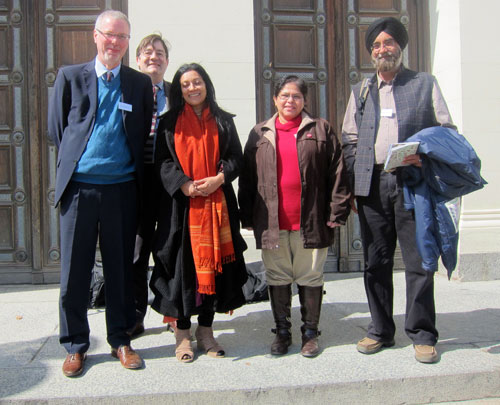
The one-day 2013 SASNET South Asia Symposium at Lund University was successfully held on Wednesday 24th april 2013, 09.00–19.00. The theme for the Symposium was ”The Wonder that is South Asia”, featuring eminent international scholars that held lectures on topics related to Bangladesh, India, Nepal, Pakistan and Sri Lanka. Venue: Palaestra, Universitetsplatsen, Lund.
The invited speakers were Professor Dina Siddiqi, BRAC University, Dhaka; Professor Surinder Jodhka, Jawaharlal Nehru University, India & ICCR Guest Professor 2012/13 at Lund University; Professor Michael Hutt, Chair, SOAS, University of London; Dr. Ayesha Siddiqa, Civilian Military Analyst and Political Commentator, Islamabad & previously Visiting Scholar at Johns Hopkins University, USA; and Professor Jonathan Spencer, University of Edinburgh.
The entire symposium was recorded by Mr. Talat Bhat, and is now available on SASNET’s YouTube Channel. Go for the recordings.
 In a concluding panel discussion the Ambassadors and Embassy representatives of Bangladesh, India, Nepal, Pakistan and Sri Lanka (four of them on photo) participated in a dialogue with the speakers on the theme for the day – ”The Wonder that is South Asia”.
In a concluding panel discussion the Ambassadors and Embassy representatives of Bangladesh, India, Nepal, Pakistan and Sri Lanka (four of them on photo) participated in a dialogue with the speakers on the theme for the day – ”The Wonder that is South Asia”.
The Symposium was followed by a cultural programme at the same venue featuring the Bamboo Flute player Shantala Subramanyam and her accompanying musicians.
More information with photos and detailed programme.


 The South Asian Students Association (SASA) was formally launched on Wednesday 24th April 2013 in connection to the 2013 SASNET South Asia Symposium held that day. SASNET deputy director Lars Eklund briefly introduced the association, and then Mr. S M Shakil (photo), SASA student representative, held a speech that marked the formal inauguration. The new forum is open for students coming from the South Asian countries studying at Lund University, but also for Swedish and other International students/researchers with an academic interest in South Asia. Besides, the door is open for students also at neighbouring universities. More information in the SASA folder.
The South Asian Students Association (SASA) was formally launched on Wednesday 24th April 2013 in connection to the 2013 SASNET South Asia Symposium held that day. SASNET deputy director Lars Eklund briefly introduced the association, and then Mr. S M Shakil (photo), SASA student representative, held a speech that marked the formal inauguration. The new forum is open for students coming from the South Asian countries studying at Lund University, but also for Swedish and other International students/researchers with an academic interest in South Asia. Besides, the door is open for students also at neighbouring universities. More information in the SASA folder.

 Dr. Astri Suhrke, senior researcher at the Chr. Michelsen Institute in Bergen, Norway, holds a SASNET lecture on ”The Failure of International Intervention in Afghanistan” at Lund University on Thursday 2 May 2013, 19.00–21.00. The seminar is organised in collaboration between SASNET and the Swedish Committee for Afghanistan (SCA) in Lund, with support from Sensus studieförbund. Venue: Auditorium (hörsalen), Centre for Languages and Literature (SOL-Centrum), Helgonabacken 12, Lund. See seminar poster.
Dr. Astri Suhrke, senior researcher at the Chr. Michelsen Institute in Bergen, Norway, holds a SASNET lecture on ”The Failure of International Intervention in Afghanistan” at Lund University on Thursday 2 May 2013, 19.00–21.00. The seminar is organised in collaboration between SASNET and the Swedish Committee for Afghanistan (SCA) in Lund, with support from Sensus studieförbund. Venue: Auditorium (hörsalen), Centre for Languages and Literature (SOL-Centrum), Helgonabacken 12, Lund. See seminar poster.
Astri Suhrke is a political scientist focusing on the social, political and humanitarian consequences of violent conflict. She has been a Professor of international relations at American University in Washington D.C., USA. She has more than 25 years of experience with Afghanistan. Her presentation in Lund is based on her book “When more is less. The International Project in Afghanistan“, a book published in 2012 and that recently was selected to be one of the winners of the Choice Magazine’s annual Outstanding Academic Titles list award. (Choice Magazine is published by the American Library Association for academic library collections). More information.
Abstract: Why didn’t the Western-led efforts to establish a new post-Taliban order in Afghanistan succeed? Many reasons have been cited for its limited achievements and ever-growing difficulties, the most common explanation being that the national, regional, and international contexts were unfavourable. Astri focuses on the dynamics of the intervention and its related peace-building mission, and asks: What were the forces shaping this grand international project? What explains the apparent systemic bias towards a deeper and broader international involvement?



 Dr. Krishnan Srinivasan, Research Fellow at the Swedish Collegium for Advanced Study (SCAS) in Uppsala during the academic year 2012/13, holds a SASNET lecture at Lund University on Tuesday 7 May 2013, 13.15–15.00. It is organised in collaboration with the Dept. of Political Science. Venue: Main university building, room 206, Universitetsplatsen, Lund. See the poster.
Dr. Krishnan Srinivasan, Research Fellow at the Swedish Collegium for Advanced Study (SCAS) in Uppsala during the academic year 2012/13, holds a SASNET lecture at Lund University on Tuesday 7 May 2013, 13.15–15.00. It is organised in collaboration with the Dept. of Political Science. Venue: Main university building, room 206, Universitetsplatsen, Lund. See the poster.
Srinivasan will speak about ”Europe’s engagement with Emerging Asia; reflections on a new roadmap”. The presentation is based on a monograph on the future relationship between Europe and the emerging powers of Asia, that he is working on during his stay in Uppsala.
Indian Ambassador to Sweden, Mrs. Banashri Bose Harrison will participate in the seminar, and hold an introductory speech.
Srinivasan is both a scholar and a diplomat (retired). He graduated from Christ Church, Oxford and joined the Indian diplomatic service in 1959. After serving as ambassador to several countries and finally being the foreign secretary, Government of India. Then he was appointed Commonwealth deputy secretary-general and held this position until 2002. Srinivasan has held several academic appointments at Oxford, Cambridge, Wassenaar and in India where he is Honorary Professor at ASCI Hyderabad and Fellow of the Maulana Azad Institute for Asian Studies at Kolkata. He is a regular columnist and book reviewer in Indian newspapers. He has published five books on international relations and some works of fiction. More information.
 |
 |
 Dr. Heinz Werner Wessler, Department of Linguistics and Philology, Uppsala University, will lecture on the Indian/Bengali Nobel Laureate Rabindranath Tagore at Theatre Sagohuset in Lund on Tuesday 7 May 2013, 19-21. Tagore received the award exactly 100 years ago in 1913, but due to the World War he could not come to Sweden to collect the prize before 1921.
Dr. Heinz Werner Wessler, Department of Linguistics and Philology, Uppsala University, will lecture on the Indian/Bengali Nobel Laureate Rabindranath Tagore at Theatre Sagohuset in Lund on Tuesday 7 May 2013, 19-21. Tagore received the award exactly 100 years ago in 1913, but due to the World War he could not come to Sweden to collect the prize before 1921.
 Indian Ambassador to Sweden, Mrs. Banashri Bose Harrisson, also participates, and she will hold an introductory speech on Tagore and his relevance today.
Indian Ambassador to Sweden, Mrs. Banashri Bose Harrisson, also participates, and she will hold an introductory speech on Tagore and his relevance today.
The lectures form part of a commemorative cultural programme organised by the Lund based Association for Indo-Swedish Cultural Exchange (AISCE) that also includes a concert by the Indian Choir of Lund and a children’s choir, both conducted by Bubu Munshi Eklund. See the poster. Venue: Sagohuset, Revingegatan, Lund. More information.

 Professor Sebastian Morris from the Indian Institute of Management (IIM) Ahmedabad, India, holds a SASNET lecture entitled ”The 2012 Gujarat Elections – Implications for Political and Economic Development in India” on Tuesday 21 May 2013, 15.15–17.00. Prof. Morris is currently Indian Council for Cultural Relations (ICCR) Chair Professor at the Copenhagen Business School (CBS). In his presentation, he focuses on the third time victory in the Gujarat state elections of the Bharatiya Janata Party (BJP) led by Chief Minister Narendra Modi. To most especially the middle-classes the elections were campaigned and won on the dual planks of “development” and “leadership in command”.
Professor Sebastian Morris from the Indian Institute of Management (IIM) Ahmedabad, India, holds a SASNET lecture entitled ”The 2012 Gujarat Elections – Implications for Political and Economic Development in India” on Tuesday 21 May 2013, 15.15–17.00. Prof. Morris is currently Indian Council for Cultural Relations (ICCR) Chair Professor at the Copenhagen Business School (CBS). In his presentation, he focuses on the third time victory in the Gujarat state elections of the Bharatiya Janata Party (BJP) led by Chief Minister Narendra Modi. To most especially the middle-classes the elections were campaigned and won on the dual planks of “development” and “leadership in command”.

 The academic seminar is immediately followed by a concert, also organised by SASNET, with Mandolin player Sugato Bhaduri, from 17.00 till 18.00. Bhaduri has toured frequently both in India and Europe, and in 2006 he was recognized to be the best mandolin soloist of the world by the Eurofestival Zupfmusik held in Bamberg, Germany. He performs North Indian Classical Music on Mandolin, an instrument hitherto rarely known in Sweden for rendering the pure & ancient form of Indian classical music that is Dhrupad.
The academic seminar is immediately followed by a concert, also organised by SASNET, with Mandolin player Sugato Bhaduri, from 17.00 till 18.00. Bhaduri has toured frequently both in India and Europe, and in 2006 he was recognized to be the best mandolin soloist of the world by the Eurofestival Zupfmusik held in Bamberg, Germany. He performs North Indian Classical Music on Mandolin, an instrument hitherto rarely known in Sweden for rendering the pure & ancient form of Indian classical music that is Dhrupad.
Venue for both seminar and concert: Auditorium (hörsalen), Centre for Languages and Literature (SOL-Centrum), Helgonabacken 12, Lund.
Full information about the 21st May SASNET event.

 The Swedish South Asian Studies Network (SASNET), the Nordic Centre in India (NCI), and the Institute for Social and Economic Change (ISEC) successfully organized an explorative workshop on “Urbanization and Migration in Transnational India: Work and Family Life from a Welfare Perspective” in Bangalore, India, during the period 5–7 March 2013. The complete workshop report, compiled by Christabel Royan, Lars Eklund and Jonathan Stoltz is now published. Read the report.
The Swedish South Asian Studies Network (SASNET), the Nordic Centre in India (NCI), and the Institute for Social and Economic Change (ISEC) successfully organized an explorative workshop on “Urbanization and Migration in Transnational India: Work and Family Life from a Welfare Perspective” in Bangalore, India, during the period 5–7 March 2013. The complete workshop report, compiled by Christabel Royan, Lars Eklund and Jonathan Stoltz is now published. Read the report.
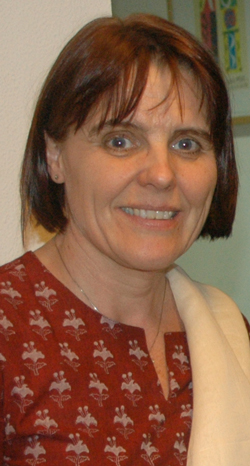
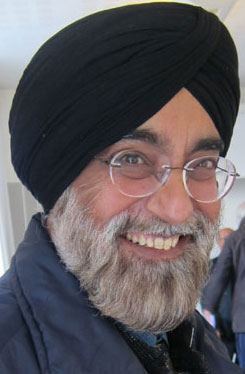
The Centre of Global South Asian Studies at the University of Copenhagen invites to a double lecture with two researchers from Lund University, ICCR Visiting Professor Surinder S. Jodhka who will talk on “Indian Village in neoliberal times: Changing Economies, Power and Identities”, and SASNET’s Director Dr. Anna Lindberg who will make a presentation on “Paradise Limited: Marriage and Dowry in Kerala”. The lecture takes place on May 2, 2013 at 13.15 in Room 24.4.07 KUA, Njalsgade, Copenhagen. The event is open for all and participation is free of charge. More information.


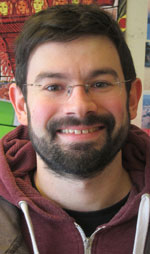
 The Center for Middle Eastern Studies (CMES) at Lund University organised a research seminar with Stefano Bigliardi, post-doc researcher at CMES, on Friday 26 April 2013, 13.15–15.00. Stefano, who defended his PhD in 2008 at the University of Bologna, has grown an interest in South Asian Islam, and in March 2013 he visited a number of universities in India including Aligarh Muslim University (AMU) with an intention to gather material for further research on Islam and science in India, and perhaps do a study in a comparative perspective with analogous debates in Hinduism. At the CMES seminar, he presented his findings. Working title is “Exploring the Contemporary Debate on Islam and Science in India.”
The Center for Middle Eastern Studies (CMES) at Lund University organised a research seminar with Stefano Bigliardi, post-doc researcher at CMES, on Friday 26 April 2013, 13.15–15.00. Stefano, who defended his PhD in 2008 at the University of Bologna, has grown an interest in South Asian Islam, and in March 2013 he visited a number of universities in India including Aligarh Muslim University (AMU) with an intention to gather material for further research on Islam and science in India, and perhaps do a study in a comparative perspective with analogous debates in Hinduism. At the CMES seminar, he presented his findings. Working title is “Exploring the Contemporary Debate on Islam and Science in India.”
In the planning for his India tour, Stefano received considerable assistance from SASNET.
The seminar explored the ideas and activities of the group of intellectuals known as Aligarh School, who, based in the university town of Aligarh in Uttar Pradesh province, have been very active in the debate on Islam and science since the 1980s. Stefano illustrated how the Aligarh School worked and which ideas it endorsed, and he drew some parallels to contemporary Indian debates on Hindusm and science. More information in CMES Newsletter.


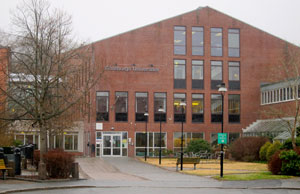
 On Friday 19th April 2013, SASNET deputy director Lars Eklund visited the Department of Biological and Environmental Sciences, University of Gothenburg, as part of his regular visits to strong South Asia related research institutions at Swedish universities. The department is beautifully situated within the Botanical Gardens of Gothenburg. It is a merger between the former departments of Marine Ecology, Plant and Environmental Sciences and Zoology that took place on 1 January 2012. Anna Godhe used to belong to the Dept of Marine Ecology.
On Friday 19th April 2013, SASNET deputy director Lars Eklund visited the Department of Biological and Environmental Sciences, University of Gothenburg, as part of his regular visits to strong South Asia related research institutions at Swedish universities. The department is beautifully situated within the Botanical Gardens of Gothenburg. It is a merger between the former departments of Marine Ecology, Plant and Environmental Sciences and Zoology that took place on 1 January 2012. Anna Godhe used to belong to the Dept of Marine Ecology.
There he met Dr. Anna Godhe and and PhD candidate Gurpreet Kahlon (on photo), both working on research within the field of Marine Ecology and involved in a major Indo-Swedish collaboration programme with the College of Fisheries in Mangalore – part of the Karnataka Veterinary, Animal and Fisheries Sciences University.
The visit to the department in Gothenburg was actually a follow-up to a visit Lars made to the Mangalore College in March 2013, when he met the Indian collaboration partners led by Prof. Indrani Karunasagar, as well as a number of Sweden based researchers, including Gurpreet Kahlon, who were in Mangalore to take part in a major mesocosm experiment on the effect of climate-induced changes in hydrography on species of harmful algae and pathogenic bacteria in the Indian Ocean. More information about Lars’ visit to Mangalore.
During his Gothenburg visist, Dr. Godhe updated Lars on the development of the Indo-Swedish project, and Ms. Kahlon showed around in the labs of the large institution.
Later the same day, Lars also attend a symposium on Indian Culture and Society that was organised by the Department of Literature, History of Ideas, and Religion (LIR) at University of Gothenburg. More information about the symposium.


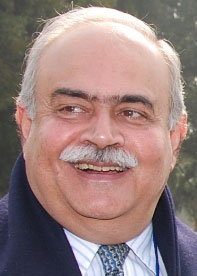
 On behalf of SASNET, Dr. Olle Frödin from the Dept. of Sociology, Lund University, participated in a seminar on India’s global role, increasing power, and foreign policy priorities at the Swedish Institute of International Affairs (UI) in Stockholm on Thursday 25 April 2013. H.E. Mr. Sudhir Vyas, Secretary (West) at the Ministry of External Affairs of India had been invited to the seminar, that was introduced by Anna Jardfelt, Director at UI.
On behalf of SASNET, Dr. Olle Frödin from the Dept. of Sociology, Lund University, participated in a seminar on India’s global role, increasing power, and foreign policy priorities at the Swedish Institute of International Affairs (UI) in Stockholm on Thursday 25 April 2013. H.E. Mr. Sudhir Vyas, Secretary (West) at the Ministry of External Affairs of India had been invited to the seminar, that was introduced by Anna Jardfelt, Director at UI.
In his presentation, Mr Vyas described India’s foreign policy priorities. Unsurprisingly, a main priority on the part of the Indian government is to safeguard the country’s food and energy needs. He assured the audience that India does not view the simultaneous rise of China as a threat, and underscored that the two Asian giants enjoygood diplomatic relations. Disagreements between the two powers are few, according to Mr Vyas, and are dealt with separately such that a mutually beneficial relationship is maintained.
Subsequently Mr Vyas, who is an alumni from the Indian Institute of Technology Kanpur (IITK), went on to describe the increasingly close trade and exchange relationships India has developed with the European Union, Africa, Latin America, and, above all, the United States, in the last few decades. India seeks to establish a closer relationship to the EU by making it easier for Indian professionals to work and establish companies in Europe, and by ensuring better market access for Indian goods and services in areas where India has a comparative advantage. In his initial address Mr Vyas avoided more delicate areas of foreign policy such as the relationship to Pakistan.
As the floor was opened up to questions from the audience, the latter issue was brought up. Mr Vyas maintained that the solution to the tense relationship between the two countries requires Pakistan to adopt a ”rational” approach. India is carefully optimistic in this regard in that it is seeing signs of change on the part of some Pakistani political parties. Anna Jardfelt, the moderator, then raised the issue of the implications of increasing multipolarity in global affairs, following the rise of Asian powers such as China and India. She specifically highlighted concerns expressed by some foreign policy observers that this trend risks impeding the global diffusion of democracy and human rights. Mr Vyas appeared almost surprised when confronted with this viewpoint, and emphasised strongly India’s deep-rooted commitment to human rights and democracy as non-negotiable values. As the short seminar drew to a close, Mr Vyas had successfully conveyed the view of India as a benign, peaceful player on the world stage.

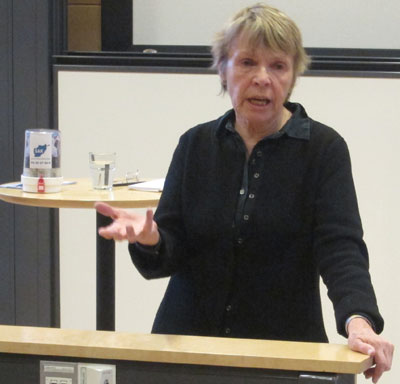 The American photo journalist Ann Jones held a highly interesting SASNET lecture on ”War Is Not Over When It’s Over. The Impact of War on Women in Afghanistan and Other Conflicts” at Lund University on Tuesday 23 April 2013. The seminar was being organised in collaboration between SASNET and the Swedish Committee for Afghanistan (SCA) in Lund, with support from Sensus studieförbund. See poster.
The American photo journalist Ann Jones held a highly interesting SASNET lecture on ”War Is Not Over When It’s Over. The Impact of War on Women in Afghanistan and Other Conflicts” at Lund University on Tuesday 23 April 2013. The seminar was being organised in collaboration between SASNET and the Swedish Committee for Afghanistan (SCA) in Lund, with support from Sensus studieförbund. See poster.
 Ann Jones is a journalist and author of a number of non-fiction books about her research into women’s and humanitarian issues. She has also written and taken photographs for a number of publications including National Geographic Traveler and The New York Times. She is also a renowned authority on domestic violence, a startlingly original inquiry into the aftermath of wars and their impact on the least visible victims: women. One of her books – ”Kabul in Winter” – dealt with Jones’ experiences in Afghanistan in 2002 and her observations of a city utterly destroyed by war, warlords and the Taliban where she felt a need to try to pick up the pieces. In her writings, Ann Jones enters the lives of everyday women and men and reveals through small events some big disjunctions: between the new Afghan ”democracy” and the still-entrenched warlords, between American promises and performance, between what’s boasted of and what is.
Ann Jones is a journalist and author of a number of non-fiction books about her research into women’s and humanitarian issues. She has also written and taken photographs for a number of publications including National Geographic Traveler and The New York Times. She is also a renowned authority on domestic violence, a startlingly original inquiry into the aftermath of wars and their impact on the least visible victims: women. One of her books – ”Kabul in Winter” – dealt with Jones’ experiences in Afghanistan in 2002 and her observations of a city utterly destroyed by war, warlords and the Taliban where she felt a need to try to pick up the pieces. In her writings, Ann Jones enters the lives of everyday women and men and reveals through small events some big disjunctions: between the new Afghan ”democracy” and the still-entrenched warlords, between American promises and performance, between what’s boasted of and what is.

 In late February 2013, SASNET Assistant webmaster Jonathan Stoltz visited a number of important research institutions in Chennai and Hyderabad in south India.
In late February 2013, SASNET Assistant webmaster Jonathan Stoltz visited a number of important research institutions in Chennai and Hyderabad in south India.
He started out at the Indian Institute of Technology Madras (IIT-M) and its beautiful campus in Kanagam, Chennai, where he met with Professor Ashok Jhunjhunwala (photo to the right, second from right), research leader of the Telecommunications and Computer Networking (TeNeT) group within the Department of Electrical Engineering at IIT-M, who during the period 2007-09, was involved in a multidisciplinary research collaboration on e-governance with BTH. Jonathan also met with Professor M. Ramasubba Reddy, Head of Laboratory, Biomedical Engineering Group at the Department of Applied Mechanics, IIT-M, who spend a year at the Department of Clinical Physiology in Lund as a postdoc during the early 1990s, as well as with Swedish student Victoria Kalén from Blekinge Institute of Technology (BTH) in Karlskrona, who is spending one year at IIT-M as an exchange student.
In Chennai Jonathan also visited the AMET Maritime University and met with its former Vice Chancelor, now Professor Emeritus, Captain S. Bhardwaj, who had just returned from a conference on Maritime Energy Efficiency at the World Maritime University (WMU) in Malmö, in which he represented India. In Malmö he had also signed a MoU between AMET and WMU regarding exchange of faculty, education, training and research.
In Hyderabad, Jonathan together with representatives from The Nordic Centre in India (NCI), its Director Dr. Kristina Myrvold and Ms. Christabel Royan, attended a meeting with Dr. John Varghese at the English and Foreign Languages University (EFLU) in Hyderabad to discuss possible strategies to assist in EFLU’s plans to establish a Department of Nordic Studies. Along with the NCI representatives Jonathan also met with the Director of the Study in India Program (SIP), at University of Hyderabad (UoH), Dr. Aparna Rayaprol, as well as with two students from University of Bergen in Norway, Gjertrud Bøhn Mageli and Marianne Fuglestrand, who are studying for a year at UoH through the semester program organised by SIP and NCI. Jonathan finaly paid a visit to the Hyderabad campus of the National Institute of Fashion Technology (NIFT) where he met with Joint Director E. Venkat Reddy and Assistant Professor Avinash Raipally. Read Jonathan’s report from the February 2013 visits.

 With support from SASNET, Jenny Murat, undergraduate student at the Lund University School of Economics and Management, has been accepted to do field work for her BA thesis at the Institute for Social and Economic Change (ISEC) in Bangalore, Karnataka, India during 7 weeks starting April 15, 2013. At ISEC she will be supervised by Professor Gopal K. Karanth, Professor of Sociology at the Centre for Study of Social Change and Development at ISEC, who during the academic year 2011/12 was the second Visiting ICCR Professor at Lund University, hosted by the Department of Sociology.
With support from SASNET, Jenny Murat, undergraduate student at the Lund University School of Economics and Management, has been accepted to do field work for her BA thesis at the Institute for Social and Economic Change (ISEC) in Bangalore, Karnataka, India during 7 weeks starting April 15, 2013. At ISEC she will be supervised by Professor Gopal K. Karanth, Professor of Sociology at the Centre for Study of Social Change and Development at ISEC, who during the academic year 2011/12 was the second Visiting ICCR Professor at Lund University, hosted by the Department of Sociology.
In her BA thesis Jenny will investigate what socio-economic factors are the most important to determine the value of dowry, and while in India she aims to interview approximately 100 married women from a village in Karnataka to collect socio-economic data such as age, income, age when married, educational level, etc. Jenny is then expecting to return to Sweden in late May/early June with enough data to make the statistical analyses for her thesis. Read more.

 Associate Professor Anette Agardh, to the left in the photo, together with PhD candidate Devika Mehra, both from the Division of Social Medicine and Global Health at Lund University, held a SASNET/ABF Thursday lunch seminar talk on Thursday 18 April 2013, 12.30–13.30 at Lunds konsthall. The presentation was about ”Improving Youth Friendly Health Services in India”, based on experiences and results from a National Training Programme on Improving Youth Friendly Health Services in India. See the poster.
Associate Professor Anette Agardh, to the left in the photo, together with PhD candidate Devika Mehra, both from the Division of Social Medicine and Global Health at Lund University, held a SASNET/ABF Thursday lunch seminar talk on Thursday 18 April 2013, 12.30–13.30 at Lunds konsthall. The presentation was about ”Improving Youth Friendly Health Services in India”, based on experiences and results from a National Training Programme on Improving Youth Friendly Health Services in India. See the poster.
The programme is a joint venture between Lund University, Mamta Institute for Mother & Child, India and the National Institute of Health and Family Welfare, India. It has been implemented at a national level with financial support from Sida since 2008. The programme aims to strengthen participants’ capacity on delivering youth friendly health services to address the sexual and reproductive health concerns of young people. It has targeted around 120 medical doctors and programme managers from the public health system and has had most successful results with approximately 50 of the participants initiating adolescent clinics in their existing facility or opened new clinics. Studies conducted have also shown that the majority of the participants have changed their attitudes towards young people and do now recognise and actively address their sexual and reproductive health and needs. Because of the successful result, the Government of India agreed to take over and run the training programme from 2013.
 SASNET’s Thursday lunch (brownbag) seminar series, aimed at presenting and disseminating the eminent South Asia related research carried out at Lund University, was launched in 2011. Since last year the seminar series is organised in collaboration with Arbetarnas Bildningsförbund (ABF) Lund, and Lunds Konsthall. The seminars, open for all interested, are held once a month on Thursdays at 12.30 inside the public art gallery (Lunds konsthall) at Mårtenstorget 3 in central Lund.More information on the SASNET/ABF Thursday Lunch Seminars
SASNET’s Thursday lunch (brownbag) seminar series, aimed at presenting and disseminating the eminent South Asia related research carried out at Lund University, was launched in 2011. Since last year the seminar series is organised in collaboration with Arbetarnas Bildningsförbund (ABF) Lund, and Lunds Konsthall. The seminars, open for all interested, are held once a month on Thursdays at 12.30 inside the public art gallery (Lunds konsthall) at Mårtenstorget 3 in central Lund.More information on the SASNET/ABF Thursday Lunch Seminars
Research Community News

 Under the umbrella of the Centre of South Asian Studies at SOAS, University of London, a Muslim South Asia Research Forum (MUSA) will be launched on Thursday 9th May 2013. The launch ceremony on May 9th will include a short opening address by Professor Werner Menski on Law, Multiculturalism and Human Rights in South Asia.
Under the umbrella of the Centre of South Asian Studies at SOAS, University of London, a Muslim South Asia Research Forum (MUSA) will be launched on Thursday 9th May 2013. The launch ceremony on May 9th will include a short opening address by Professor Werner Menski on Law, Multiculturalism and Human Rights in South Asia.
MUSA is a new cross-disciplinary initiative focused on bringing together PhD students and early career researchers working on any aspect of Muslim societies in the countries of South Asia. The ‘Muslim’ in MUSA is meant in the broadest sense, including communities and cultures that interface with Muslim societies in any context. Geographically the organisers cut a wide swathe, encompassing Afghanistan, Pakistan, India, Bangladesh, Sri Lanka, Maldives, Nepal, Bhutan and their diasporic communities. The ambition is to reach out to young researchers and practitioners internationally, by hosting regular networking events and a one-day, annual conference. MUSA will also build a directory of researchers on Muslim South Asia, which includes information on their specific research topics.
More information on MUSA web page.

Anders Widmark from the Division of Iranian Languages, Department of Linguistics and Philology, Uppsala University defended his doctoral dissertation thesis entitled ”Voices at the Borders, Prose on the Margins: Exploring the Contemporary Pashto Short Story in a Context of War and Crisis”, on 24 November 2011. It is a study of contemporary Pashto prose writing in a context of war and crisis based on a corpus of digitally published and/or printed short stories from the 1990s onwards. Out of this larger corpus, 16 stories have been selected and analysed under four topics: ”The Terrorist”, Female agency: Representations of and by, ”The Madman”, and Axtar: Longing for peace or imaging disillusion. A central idea is that the analysis should be text-oriented, but the contextualisation of the analysed texts is a secondary important focus. The faculty opponent was Profesor Christina Oesterheld, Dept. of Modern South Asian Languages and Literatures, University of Heidelberg, Germany. More information including link to full-text thesis.

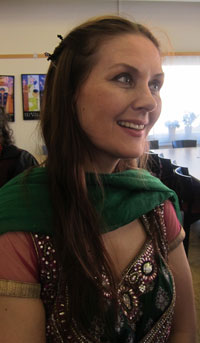
The Department of Literature, History of Ideas, and Religion (LIR) at University of Gothenburg organized a half-day Symposium on Indian Culture and Society, on Friday 19 April 2013. Lars Eklund from SASNET attended the symposium.
The programme, prepared by Professor Åke Sander, included lectures by two of the current Indian Council for Cultural Relations (ICCR) Visiting Professors in Sweden, namely Ashok Kaul, ICCR guest professor at the University of Gothenburg, who talked about ”Kashmir – a road forward”; and Surinder Jodhka, ICCR guest professor at Lund University, who talked about ”The future of caste and power”. On photo together.
The programme also included a presentation by Ms. Anette Pooja (photo to the left)on ”Studying Indian dance as a Western woman”, a lecture by Dr. Shashank Srivastava on ”Indian philosophy and post-modernism”, and by Associate Professor Clemens Cavallin on ”Teaching Hinduism as a Western scholar”. See the programme.
An additional programme was added, namely the screening of the documentary film ”So Heddan So Hoddan” (Like Here Like There), made by professors Anjali Monteiro and Kizhavana Jayasankar from the TataInstitute of Social Studies (TISS) in Mumbai, India.

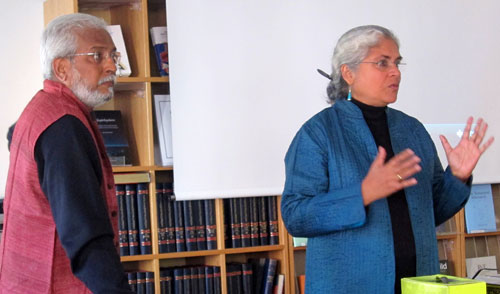 They had come to attend the symposium since they spend the month of April 2013 at Lund.University as scholarship holders through the Erasmus Mundus Action 2 mobility programme EMEA.
They had come to attend the symposium since they spend the month of April 2013 at Lund.University as scholarship holders through the Erasmus Mundus Action 2 mobility programme EMEA.
 Their fascinating film focuses on the communities in Kachchh, Gujarat, India and across the border in Sindh (now in Pakistan). Many of their Sufi poems draw on the eternal love stories of /Umar-Marui/ and /Sasui-Punhu/, among others. These songs speak of the pain of parting, of the inevitability of loss and of deep grief that takes one to unknown and mysterious terrains. More information about the film that became the focus for a vivid discussion afterwards.
Their fascinating film focuses on the communities in Kachchh, Gujarat, India and across the border in Sindh (now in Pakistan). Many of their Sufi poems draw on the eternal love stories of /Umar-Marui/ and /Sasui-Punhu/, among others. These songs speak of the pain of parting, of the inevitability of loss and of deep grief that takes one to unknown and mysterious terrains. More information about the film that became the focus for a vivid discussion afterwards.


 A Memorandum of Understanding (MoU) between the The World Maritime University (WMU) in Malmö and AMET University, located in Chennai, India, was signed on 22 February, 2013. Professor Emeritus and Former Vice Chancellor Captain S. Bhardwaj (photo to the right, seated in the middle, between WMU President Björn Kjerfve to the left and WMU Vice-President Academic Neil Bellafontaine to the right) signed on behalf of AMET University.
A Memorandum of Understanding (MoU) between the The World Maritime University (WMU) in Malmö and AMET University, located in Chennai, India, was signed on 22 February, 2013. Professor Emeritus and Former Vice Chancellor Captain S. Bhardwaj (photo to the right, seated in the middle, between WMU President Björn Kjerfve to the left and WMU Vice-President Academic Neil Bellafontaine to the right) signed on behalf of AMET University.
The agreement enables linkages in the field of maritime safety, security, and marine and maritime environmental management. Efforts between both parties will focus on academic information exchange, exchange of faculty members, education and training for AMET faculty and students at WMU or potential WMU Professional Development Course offerings in Chennai, and collaboration in joint research and technical and scientific programs and projects where feasible. It is notable that the Chancellor of AMET is E.E. Mitropoulos, former IMO Secretary-General and Chancellor of WMU.

 The University of East Anglia, through a collaboration of its Sainsbury Institute for Art and the South Asian Decorative Arts and Crafts Collection, is seeking to appoint a suitably qualified applicant for a full-time PhD studentship on an aspect of the SADACC holdings for three years, commencing 1 October 2013.
The University of East Anglia, through a collaboration of its Sainsbury Institute for Art and the South Asian Decorative Arts and Crafts Collection, is seeking to appoint a suitably qualified applicant for a full-time PhD studentship on an aspect of the SADACC holdings for three years, commencing 1 October 2013.
The collection comprises nearly 4000 items, focusing on South Asia and to a lesser extent the neighbouring countries of Afghanistan, Burma, Thailand and Indonesia. It is housed in arestored Victorian skating rink in central Norwich. More details on the collection and the work of the SADACC Trust can be found at www.sadacc.co.uk. Applicants may wish to contact the Collection Curator, Diana Grattan, or the Trustees, Dr and Mrs Millward (01603 663890 or info@sadacc.co.uk) to obtain more details of the collection before making an application. Onthe basis of these discussions, an outline proposal for research leading to a PhD will be required. Read more.

![]()
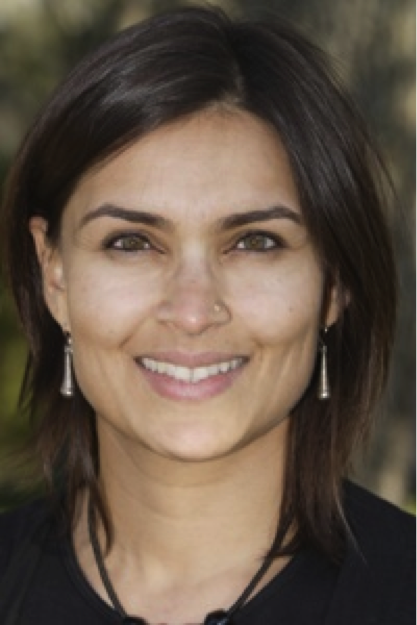 Sunila Kale, assistant professor at the Henry M. Jackson School of International Studies at University of Washington in Seattle, USA, has won the 2013 Joseph W. Elder Prize in the Indian Social Sciences from the American Institute of Indian Studies (AIIS) – a consortium of 73 universities and colleges that is dedicated to the advancement of knowledge about India and the promotion of intellectual engagement with India in the United States.
Sunila Kale, assistant professor at the Henry M. Jackson School of International Studies at University of Washington in Seattle, USA, has won the 2013 Joseph W. Elder Prize in the Indian Social Sciences from the American Institute of Indian Studies (AIIS) – a consortium of 73 universities and colleges that is dedicated to the advancement of knowledge about India and the promotion of intellectual engagement with India in the United States.
Kale’s book manuscript, Electrifying India: Regional Political Economies of Development, is under contract with Stanford University Press. In the book, Kale investigates why, more than six decades after independence, so much of India—especially rural India—is still not electrified or has intermittent and poor-quality electricity delivery.
Throughout the 20th century, electrification was considered to be the primary vehicle of modernity and development, as well as its quintessential symbol. In India, electricity was central to the conceptualization of Indian modernity by early nationalists and planners and huge sums were spent on electrification from then until now. Yet, despite all this, today nearly 400 million Indians have no access to electricity. Kale’s teaching and research focus on Indian and South Asian politics and the political economy of development. Electrifying India explores the political and historical puzzle of uneven development in India’s vital electricity sector. Read more.

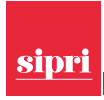 During March 18-22, 2013, representatives from Stockholm International Peace Research Institute (SIPRI) visited India. The purpose of the visit was to establish deeper forms of international cooperation and research exchanges and ultimately build new areas of research with an international impact within SIPRI and its regional counterparts in India. During the visit, the SIPRI delegation, led by its Chairman Mr. Göran Lennmarker and its Director Dr. Tilman Brück, met a number of research institutions, think-tanks and academicians as well as government officials and prominent thinkers on security and foreign policy.
During March 18-22, 2013, representatives from Stockholm International Peace Research Institute (SIPRI) visited India. The purpose of the visit was to establish deeper forms of international cooperation and research exchanges and ultimately build new areas of research with an international impact within SIPRI and its regional counterparts in India. During the visit, the SIPRI delegation, led by its Chairman Mr. Göran Lennmarker and its Director Dr. Tilman Brück, met a number of research institutions, think-tanks and academicians as well as government officials and prominent thinkers on security and foreign policy.
When in India, SIPRI also released its latest report, “Trends in international arms transfers, 2012”.
SIPRI is an independent international institute dedicated to research into conflict, armaments, arms control and disarmament with its head office in Stockholm and presence in Beijing and Washington D.C.

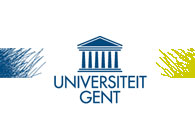 The Faculty of Political and Social Sciences of Ghent University, Belgium, announces a vacancy in the Department for Conflict and Development Studies, for a full-time (100%) position as professor (in the rank of lecturer – tenure track), with a focus on scientific research funded by the Special Research Fund (BOF), in the discipline of conflict and development, in view of further expanding the research on the linkages between governance, violence and conflict.
The Faculty of Political and Social Sciences of Ghent University, Belgium, announces a vacancy in the Department for Conflict and Development Studies, for a full-time (100%) position as professor (in the rank of lecturer – tenure track), with a focus on scientific research funded by the Special Research Fund (BOF), in the discipline of conflict and development, in view of further expanding the research on the linkages between governance, violence and conflict.
Candidates should hold a PhD degree in Political and Social Sciences with a doctoral thesis or a degree recognized as equivalent and, at the onset of the appointment, have at least two years of postdoctoral experience, plus extensive academic research on South Asia related to conflict and development, proven by national and international peer-reviewed publications. Deadline for applications is 8 May 2013. More information.
Educational News

 The first batch of students resulting from a unique education initiative came from Afghanistan to Karlstad University on April 15, 2013 and will stay for the following two weeks. The thirteen teacher students will present their Master’s theses at the university as well as meet with Swedish teacher students and visit local schools in Karlstad. Some of the students will also hold open lectures and talk about education in Afghanistan and the situation for women in the country.
The first batch of students resulting from a unique education initiative came from Afghanistan to Karlstad University on April 15, 2013 and will stay for the following two weeks. The thirteen teacher students will present their Master’s theses at the university as well as meet with Swedish teacher students and visit local schools in Karlstad. Some of the students will also hold open lectures and talk about education in Afghanistan and the situation for women in the country.
 The students are approaching the end of the first part of the Teacher Educators Master Program (TEMP), a unique project and collaboration between the Ministry of Education in Afghanistan, The Swedish Committee for Afghanistan and Karlstad University with the aim to improve the quality of teacher’s education in Afghanistan. The programme is coordinated by Dr. Pia Karlsson and Dr. Amir Mansory, both at the Dept. of Educational Work, Organisation and Society at Karlstad University.
The students are approaching the end of the first part of the Teacher Educators Master Program (TEMP), a unique project and collaboration between the Ministry of Education in Afghanistan, The Swedish Committee for Afghanistan and Karlstad University with the aim to improve the quality of teacher’s education in Afghanistan. The programme is coordinated by Dr. Pia Karlsson and Dr. Amir Mansory, both at the Dept. of Educational Work, Organisation and Society at Karlstad University.
The education programme is one and a half or two and a half years and includes theory and practice around learning and general didactics as well as subject specific didactics, and during 2012-2014, approximately 80 teacher’s trainers will be educated. A priority group is women, and among the 13 students who will visit Karlstad University, four are women.
The students are enrolled at the University of Karlstad, but training takes place at the National Academy of the Teacher Education Department in Kabul. Part of the training is done online, but teachers from Karlstad University is in place in Afghanistan at the beginning of each course. For more information you may contact either of the Programme Coordinators, pia.karlsson@kau.se or amir.mansory@kau.se.

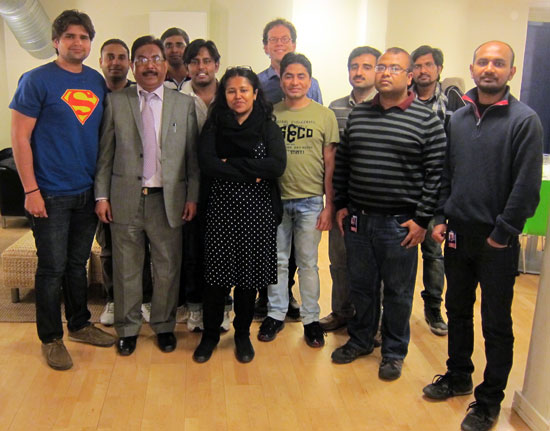 In connection to his participation in the SASNET South Asia Symposium on April 24th, 2013, Mr. J.P. Meena – Counsellor (Political, Consular, Information & Press) at the Embassy of India in Stockholm, had invited Indian students at Lund University to meet him on the evening before, that is Tuesday 23 April. The meeting was held in the basement lounge of the university’s Division of External Relations (ER), Stora Algatan 4. Mr Meena was accompanied by Lars Eklund, SASNET deputy director.
In connection to his participation in the SASNET South Asia Symposium on April 24th, 2013, Mr. J.P. Meena – Counsellor (Political, Consular, Information & Press) at the Embassy of India in Stockholm, had invited Indian students at Lund University to meet him on the evening before, that is Tuesday 23 April. The meeting was held in the basement lounge of the university’s Division of External Relations (ER), Stora Algatan 4. Mr Meena was accompanied by Lars Eklund, SASNET deputy director.
Students on all levels and from any discipline were welcome to the meeting, that had been planned for by SASNET and the Division of External Relations on behalf of the Embassy of India. Snacks were served, thanks to generous host for the evening, Mr. Henrik Hofvendahl, Program Officier at the Strategic Partnerships and Networks, Division of External Relations.

 Maritime University (WMU) in Malmö, Sweden, invites applications from students to join its Master of Science (M.Sc.) Programme in Maritime Affairs. Students joining WMU in 2013 will follow a modernized, intensive postgraduate program lasting 14 months. The pre-sessional English and Study Skills program starts 24 June 2013, and The standard M.Sc. program starts 16 September 2013, with graduation in November the following year. Students who already hold a postgraduate qualification can apply for the 11-months program that begins 13 January 2014. The students can specialize in one of six different areas:
Maritime University (WMU) in Malmö, Sweden, invites applications from students to join its Master of Science (M.Sc.) Programme in Maritime Affairs. Students joining WMU in 2013 will follow a modernized, intensive postgraduate program lasting 14 months. The pre-sessional English and Study Skills program starts 24 June 2013, and The standard M.Sc. program starts 16 September 2013, with graduation in November the following year. Students who already hold a postgraduate qualification can apply for the 11-months program that begins 13 January 2014. The students can specialize in one of six different areas:
1. Shipping Management & Logistics; 2. Port Management; 3. Maritime Safety & Environmental Administration; 4. Maritime Law & Policy; 5. Marine Environmental & Ocean Management; 6. Maritime Education & Training.
There is no deadline for application submission, however, if you are applying for donor funding, you should submit your application as early as possible. More information.
Seminars and Conferences in Scandinavia

 The Forum for South Asia Studies at Uppsala University invites to a seminar on ”Democracy and Foreign Policy in India” with Dr. Christian Wagner, German Institute for International and Security Affairs. It will be an Open lecture to be held on Thursday 2 May 2013, 15:15-17:00. Venue: House 2, sal 0076, Uppsala University, Engelska parken, Thunbergsvägen 3H.
The Forum for South Asia Studies at Uppsala University invites to a seminar on ”Democracy and Foreign Policy in India” with Dr. Christian Wagner, German Institute for International and Security Affairs. It will be an Open lecture to be held on Thursday 2 May 2013, 15:15-17:00. Venue: House 2, sal 0076, Uppsala University, Engelska parken, Thunbergsvägen 3H.
In his presentation, Dr. Wagner focuses on the fact that India is often emphasizing its common democratic values in its relations with the EU and the United States. This raises the question of how far the promotion of democracy has become an instrument of India’s foreign policy as it is the case with Europe and the U.S. The lecture will first look at domestic changes in India’s democracy and its implications on foreign policy. The second part will look at India’s attempts to promote democratic processes. More information.

 An Indo-Swedish research workshop on ”Reverse and intensified globalisation – the case of ICT. Flows and networks of trade, FDI, skilled labour, students, knowledge and ideas from India to regions in Europe” will be held in Norrköping, Sweden, on 6–7 May 2013. The theme for this workshop is inspired by research debates challenging what may be summarised as the school book image of globalisation and international division of labour between the ‘Global North’ and ‘Global South’ in a given hierarchical order. The workshop is organised by the Centre for Municipal Studies, Linköping University, Campus Norrköping in collaboration with the departments of Computer and Systems Sciences, and Human Geography, Stockholm University; and the International Institute of Information Technology (IITB) in Bangalore, India.
An Indo-Swedish research workshop on ”Reverse and intensified globalisation – the case of ICT. Flows and networks of trade, FDI, skilled labour, students, knowledge and ideas from India to regions in Europe” will be held in Norrköping, Sweden, on 6–7 May 2013. The theme for this workshop is inspired by research debates challenging what may be summarised as the school book image of globalisation and international division of labour between the ‘Global North’ and ‘Global South’ in a given hierarchical order. The workshop is organised by the Centre for Municipal Studies, Linköping University, Campus Norrköping in collaboration with the departments of Computer and Systems Sciences, and Human Geography, Stockholm University; and the International Institute of Information Technology (IITB) in Bangalore, India.
The Norrköping workshop will be folllowed up with another workshop to be held in India in November 2013. The research workshops will also be followed up with seminars with actors outside the academy (including companies, trade organisation and politicians and other organisations with interest in relations of ICT activities between India and Europe). Full information about the Norrköping workshop.

 The Institute for Security and Development Policy (ISDP) and its Asia Program invites to a seminar with H.E. Mr. Sajjad Kamran, Pakistani Ambassador to Sweden, on Tuesday 7 May 2013, 10.00 – 12.00. He will speak about ”Pakistan Elections. Challenges and Opportunities for the Upcoming Government”. To attend, register to Ms. Silvia Pastorelli before 6th May. Venue: ISDP, Västra Finnbodavägen 2, Stockholm-Nacka.
The Institute for Security and Development Policy (ISDP) and its Asia Program invites to a seminar with H.E. Mr. Sajjad Kamran, Pakistani Ambassador to Sweden, on Tuesday 7 May 2013, 10.00 – 12.00. He will speak about ”Pakistan Elections. Challenges and Opportunities for the Upcoming Government”. To attend, register to Ms. Silvia Pastorelli before 6th May. Venue: ISDP, Västra Finnbodavägen 2, Stockholm-Nacka.
Mr. Kamran is a career diplomat, who was posted in Stockholm as recently as February this year. Previously the Ambassador held the position as Additional Secretary (Asia & Pacific) at the Ministry of Foreign Affairs, Islamabad, Pakistan. 2005 – 2009 he was the Ambassador to the Republic of Uzbekistan and before that Minister at the Embassy of Pakistan to the Netherlands. Ambassador Sajjad Kamran has a Master’s Degree in English Literature from Government College Lahore, Pakistan.
The general election to the 14th parliament of Pakistan will be held on 11 May 2013. In the general election, voting will take place in all parliamentary constituencies of Pakistan, to elect Members to seats in the National Assembly, the lower house of parliament and to the four Provincial Assemblies (Punjab Assembly,Sindh Assembly, Baluchistan Assembly and Khyber Pakhtunkhwa Assembly).


 PhD candidate Siddharth Sareen from the Department of Food and Resource Economics, University of Copenhagen’s Faculty of Science, holds a guest lecture at Lund University on Tuesday 21 May 2013, 13.15–15.00. He will speak about ”Forest access for indigenes during political transformation in a resource-rich region”, focusing on the state of Jharkhand in eastern India. Siddharth works within the Section for Global Development at his department. He has a background in development studies and is part of the Erasmus Mundus joint doctoral programme Forest and Nature for Society. Venue for the seminar: Dept. of Sociology, Paradisgatan 5, Lund.
PhD candidate Siddharth Sareen from the Department of Food and Resource Economics, University of Copenhagen’s Faculty of Science, holds a guest lecture at Lund University on Tuesday 21 May 2013, 13.15–15.00. He will speak about ”Forest access for indigenes during political transformation in a resource-rich region”, focusing on the state of Jharkhand in eastern India. Siddharth works within the Section for Global Development at his department. He has a background in development studies and is part of the Erasmus Mundus joint doctoral programme Forest and Nature for Society. Venue for the seminar: Dept. of Sociology, Paradisgatan 5, Lund.
Jharkhand came into being in 2000. The state presents a resource-rich democracy-building context with 40 percent of the country’s mineral wealth but high rates of poverty. Domestic and international mining companies have a large stake in securing land, while the state holds a monopoly over commercial timber even as it allows a significant tribal population access to minor forest produce. Progressive but hard-to-implement legislation safeguards the rights of indigenous, land-dependent peoples such as the Ho even as the regional political economy threatens them, creating what Anna Tsing elsewhere describes as a ‘resource frontier’. This seminar seeks to examine what factors determine Hos’ access to forests they have traditionally used as commons, in the post-1991 period of a liberalising-privatising-globalising national avatar that is coincident with decentralisation in natural resource governance. More information.



 The Institute for Security and Development Policy (ISDP) and its Asia Program invites to a seminar with Dr. Ishtiaq Ahmed, Professor Emeritus of Political Science at Stockholm University, on Tuesday 21 May 2013, 10.00 – 12.00. He will speak about ”Pakistan: The Garrison State, Origins, Evolution, Consequences (1947-2011)”, a presentation based on his recent book with the same title. To attend, register to Ms. Silvia Pastorellibefore 20th May. Venue: ISDP, Västra Finnbodavägen 2, Stockholm-Nacka.
The Institute for Security and Development Policy (ISDP) and its Asia Program invites to a seminar with Dr. Ishtiaq Ahmed, Professor Emeritus of Political Science at Stockholm University, on Tuesday 21 May 2013, 10.00 – 12.00. He will speak about ”Pakistan: The Garrison State, Origins, Evolution, Consequences (1947-2011)”, a presentation based on his recent book with the same title. To attend, register to Ms. Silvia Pastorellibefore 20th May. Venue: ISDP, Västra Finnbodavägen 2, Stockholm-Nacka.
Abstract: In 1947, the Pakistan military was poorly trained and poorly armed. It also inherited highly vulnerable territory vis-à-vis the much bigger India, aggravated because of serious disputes with Afghanistan. Defence and security were therefore issues that no Pakistan government, civil or military, could ignore. The military did not take part in politics directly until 1958, although it was called upon to restore order in 1953 in the Punjab province. Over the years, the military, or rather the Pakistan Army, continued to grow in power and influence, and progressively became the most powerful institution. Moreover, it became an institution with de facto veto powers at its disposal to overrule other actors within society including elected governments. Simultaneously, it began to acquire foreign patrons and donors willing to arm it as part of the Cold War competition (the United States), regional balance-of-power concerns (China), and ideological contestants for leadership over the Muslim world (Saudi Arabia, to contain Iranian influence). A perennial concern with defining the Islamic identity of Pakistan, exacerbated by the Afghan jihad, resulted in the convergence of internal and external factors to produce the ‘fortress of Islam’ self-description that became current in the early twenty-first century. Over time, Pakistan succumbed to extremism and terrorism within and was accused of being involved in similar activities within the South Asian region and beyond. Such developments have been ruinous to Pakistan’s economic and democratic development. More information.

 The Institute of Social Anthropology at University of Oslo organises a seminar entitled ”The Intimacy of Insurgency: Beyond Coercion, Greed or Grievance in Maoist India” on Wednesday 22 May 2013, 14.15–16.00. The seminar will be opened with a presentation by Dr. Alpa Shah from Dept of Anthropology, London School of Economics (LSE), UK. Venue: Eilert Sunds Hus, 6th floor, Blindern, Oslo.
The Institute of Social Anthropology at University of Oslo organises a seminar entitled ”The Intimacy of Insurgency: Beyond Coercion, Greed or Grievance in Maoist India” on Wednesday 22 May 2013, 14.15–16.00. The seminar will be opened with a presentation by Dr. Alpa Shah from Dept of Anthropology, London School of Economics (LSE), UK. Venue: Eilert Sunds Hus, 6th floor, Blindern, Oslo.
Alpa Shah is a social anthropologist interested in inequality and efforts to address it. She has drawn on more than a decade of field research in India to explore how marginalised people experience indigenous rights activism and Adivasi politics; poverty, the developmental state and corruption; seasonal casual labour migration and transformations in the agrarian economy; the state, education and positive action policies; and the radical left and emancipatory politics, notably the Maoist movement. In the book “In the shadow of the state” (Duke University Press, 2010) Shah argues that well-meaning indigenous rights and development claims and interventions may misrepresent and hurt the very people they seek to help.

 Aalborg University, Denmark, invites to an international workshop on ‘Development Challenges in Bhutan’, to be held in Copenhagen 29–30 May 2013. The title of the workshop shows that we will be witness to a kaleidoscope of topics and views at this interesting gathering. The occasion is ongoing Research and PhD programmes involving Danish and Bhutanese researchers, jointly funded by Danida and the Royal University of Bhutan. Five PhD candidates from Bhutan, and five senior researchers from Bhutan and Denmark, respectively, will take part in the workshop plus additional participants.
Aalborg University, Denmark, invites to an international workshop on ‘Development Challenges in Bhutan’, to be held in Copenhagen 29–30 May 2013. The title of the workshop shows that we will be witness to a kaleidoscope of topics and views at this interesting gathering. The occasion is ongoing Research and PhD programmes involving Danish and Bhutanese researchers, jointly funded by Danida and the Royal University of Bhutan. Five PhD candidates from Bhutan, and five senior researchers from Bhutan and Denmark, respectively, will take part in the workshop plus additional participants.
Issues which will be covered are: Assessment practices in Schools, Health and Education; ICT; eGovernance; Foreign policy; and the Status of Gross National Happiness. A keynote lecture on ‘Sociocultural and political developments in Bhutan since 1990: reflections from a distance’ will be delivered by Professor Michael Hutt, SOAS, University of London, UK. The organisers plan to publish the papers from the workshop afterwards. More information.
Conferences and workshops outside Scandinavia
South Asia related culture in Scandinavia

 In commemoration of the centennary jubilee of Rabindranath Tagore’s Nobel Prize award in 1913, the dance troupe Baithak from London (led and directed by Dr. Sangeeta Datta) performs in Stockholm on Tuesday 4th June2013, at 19.00.
In commemoration of the centennary jubilee of Rabindranath Tagore’s Nobel Prize award in 1913, the dance troupe Baithak from London (led and directed by Dr. Sangeeta Datta) performs in Stockholm on Tuesday 4th June2013, at 19.00.
They wlll give a performance entitled ”Gitanjali”, named after the collection of poems whose English translations convinced the Swedish Academy to give the Nobel Prize to Tagore. Sangeeta Datta is versatile-director, singer and an exponent of Tagore songs. Her group Padatik has performed in various parts of Europe. Renowned Indian film actress Sharmila Tagore, the heroine of several Satyajit Ray movies, will also participate as a guest artist. Venue: ABF-Huset, Z-salen, Sveavägen 41, Stockholm. Tickets are sold for SEK 200. See a video on the Gitanjali performance.
More information.

 On Tuesday 7 May 2013, at 19.00, the Lund based Association for Indo-Swedish Cultural Exchange (AISCE) organises a cultural programme in honour of the Indian/Bengali Nobel Laureate Rabindranath Tagore, who was the first non-European writer to be awarded the Nobel Prize in Literature in 1913. The programme features the Indian Choir of Lund, singing Tagore’s songs, being conducted by Bubu Munshi Eklund, and a presentation about Tagore in Sweden by Dr. Heinz Werner Wessler, Department of Linguistics and Philology, Uppsala University.
On Tuesday 7 May 2013, at 19.00, the Lund based Association for Indo-Swedish Cultural Exchange (AISCE) organises a cultural programme in honour of the Indian/Bengali Nobel Laureate Rabindranath Tagore, who was the first non-European writer to be awarded the Nobel Prize in Literature in 1913. The programme features the Indian Choir of Lund, singing Tagore’s songs, being conducted by Bubu Munshi Eklund, and a presentation about Tagore in Sweden by Dr. Heinz Werner Wessler, Department of Linguistics and Philology, Uppsala University.
Indian Ambassador to Sweden, Mrs. Banashri Bose Harrisson, is the guest of honour, and she will hold an introductory speech on Tagore and his relevance today. See the poster.
 The Association for Indo-Swedish Cultural Exchange is a membership based cultural organisation exisiting since the early 1990s, chaired by SASNET deputy director Lars Eklund. The association organises concerts, dance performances and other cultural activities in southern Sweden, and since last year its Indian Choir has held several appreciated concerts in Lund (photo from concert event with Indian Ambassador at Lund University in October 2012).
The Association for Indo-Swedish Cultural Exchange is a membership based cultural organisation exisiting since the early 1990s, chaired by SASNET deputy director Lars Eklund. The association organises concerts, dance performances and other cultural activities in southern Sweden, and since last year its Indian Choir has held several appreciated concerts in Lund (photo from concert event with Indian Ambassador at Lund University in October 2012).
More information about AISCE.
Venue for the May 7th concert: Sagohuset, Revingegatan, Lund.
Tickets can be reserved by sending an e-mail to the AISCE treasurer, Mr. Christer Fahlström.


 Swedish writer Zac O’Yeah, since several years residing in Bangalore, India, and married to the author Anjum Hasan, is now getting more and more recognition as an established literary person in his adopted homeland India. Zac O’Yeah, who has published twelve books in Swedish language, among them a biography on Mahatma Gandhi (which was short-listed for the August Prize 2008 for best nonfiction book of the year), and a brilliant book on Indian religion, recently published a crimi book for the Indian market entitled ”Mr Majestic – the Tout of Bengaluru”, that already has become a bestseller.
Swedish writer Zac O’Yeah, since several years residing in Bangalore, India, and married to the author Anjum Hasan, is now getting more and more recognition as an established literary person in his adopted homeland India. Zac O’Yeah, who has published twelve books in Swedish language, among them a biography on Mahatma Gandhi (which was short-listed for the August Prize 2008 for best nonfiction book of the year), and a brilliant book on Indian religion, recently published a crimi book for the Indian market entitled ”Mr Majestic – the Tout of Bengaluru”, that already has become a bestseller.
The Indian magazine Outlook in its March 25th, 2013 issue described Zac and his writing as follows:
”Pitted against Scandinavian crime fiction, which is having a long season, Mr Majestic – the Tout of Bengaluru, is Bollywood to European arthouse. And no, not the ‘meaningful’ multiplex cinema of today either, filmed in shades of blue and bleak, but gloriously, unabashedly Technicolor with full-on frontal lighting, over-the-top escapades and sheer joy seeping out of every frame, as summed up in Paul Fernandes’ cheeky cover art. Zac O’Yeah – Swedish by birth, incidentally, and Bangalorean by choice – casts a droll eye on everything familiar to the urban Indian, and a lot that escapes him entirely, and wrings out a novel that’s not quite like anything done before in the English language.”
Read the full book review, written by Sumana Mukherjee.

 Out of Print Magazine is the name of an online short fiction magazine for writing connected to the South Asian subcontinent. They feature some very interesting contemporary short fiction writers who write in English, or whose work has been translated into English, including U.R. Ananthamoorthy, Salma, Anjum Hasan, Chandrahas Choudhury, and Kuzhali Manickavel. The Out of Print Magazine also provides a platform for new writers and on the accompaniyng blog they are building a database of literary magazines with a connection to the subcontinent. Out of Print Magazine’s Founding Editor is Ms. Indira Chandrasekhar. Visit the Out of Print Magazine website.
Out of Print Magazine is the name of an online short fiction magazine for writing connected to the South Asian subcontinent. They feature some very interesting contemporary short fiction writers who write in English, or whose work has been translated into English, including U.R. Ananthamoorthy, Salma, Anjum Hasan, Chandrahas Choudhury, and Kuzhali Manickavel. The Out of Print Magazine also provides a platform for new writers and on the accompaniyng blog they are building a database of literary magazines with a connection to the subcontinent. Out of Print Magazine’s Founding Editor is Ms. Indira Chandrasekhar. Visit the Out of Print Magazine website.

 The Amsterdam based Prince Claus Fund of the Netherlands has issued a Call for proposals on cultural initiatives related to the Rethinking of Public Space. The term “public space” is defined as a social space that is open and accessible to all. A public space can take many different forms. It can be a gathering place defined by its social aspect, a civic space, a community space, a virtual space… The Prince Claus Fund is particularly interested in projects that facilitate freedom of expression, stimulate dialogue and encourage cultural exchange. The Fund has a five year focus on the theme of culture and conflict and encourages project proposals related to this theme. The Prince Claus Fund supports projects with an average grant of 20.000 Euros. This call is open to individuals and organisations based in Africa, Asia, Latin America and the Caribbean. Projects in Bangladesh, Bhutan and Nepal have been awarded grants in the recent past. The deadline for the submission of projects is 15 May 2013. More information.
The Amsterdam based Prince Claus Fund of the Netherlands has issued a Call for proposals on cultural initiatives related to the Rethinking of Public Space. The term “public space” is defined as a social space that is open and accessible to all. A public space can take many different forms. It can be a gathering place defined by its social aspect, a civic space, a community space, a virtual space… The Prince Claus Fund is particularly interested in projects that facilitate freedom of expression, stimulate dialogue and encourage cultural exchange. The Fund has a five year focus on the theme of culture and conflict and encourages project proposals related to this theme. The Prince Claus Fund supports projects with an average grant of 20.000 Euros. This call is open to individuals and organisations based in Africa, Asia, Latin America and the Caribbean. Projects in Bangladesh, Bhutan and Nepal have been awarded grants in the recent past. The deadline for the submission of projects is 15 May 2013. More information.
New and updated items on SASNET web site
• Swedish departments where research on South Asia is going on
Constantly added to the list of research environments at Swedish universities, presented by SASNET. The full list now includes 300 departments, with detailed descriptions of the South Asia related research and education taking place! See the full list of departments here: http://www.sasnet.lu.se/institutions/reserch-environments
• Useful travelling information
Look at our Travel Advice page. Updated travel advises from the The British Foreign & Commonwealth Office about safety aspects on travelling to the countries of South Asia.
Best regards
Lars Eklund
Deputy director/webmaster
SASNET/Swedish South Asian Studies Network



 The Asia Research Institute (ARI) at the National University of Singapore organises a workshop on “Violence, Insurgencies, Deceptions: Conceptualizing Urban Life in South Asia”, during 6-7 May 2013. This multidisciplinary workshop explores the nature of and relationship between violence and insurgent practices and the limits and slippages of state sovereignty that are constituted in the making of the built and social environments. The conference approach the political sphere in urban South Asia as a dynamic embedded in the lived conditions of city life and buttressed by the voices of refusal, separation, resistance and uncertainty.
The Asia Research Institute (ARI) at the National University of Singapore organises a workshop on “Violence, Insurgencies, Deceptions: Conceptualizing Urban Life in South Asia”, during 6-7 May 2013. This multidisciplinary workshop explores the nature of and relationship between violence and insurgent practices and the limits and slippages of state sovereignty that are constituted in the making of the built and social environments. The conference approach the political sphere in urban South Asia as a dynamic embedded in the lived conditions of city life and buttressed by the voices of refusal, separation, resistance and uncertainty.
 The 5th International Conference of the South and Southeast Asian Association for the Study of Culture and Religion (SSEASR) will be held at Manila, the Philippines, 16–19 May 2013. the Conference is being organized by the National Museum of the Philippines in Manila from May 16 to 19 2013, and will be held in collaboration with some local Universities(details being worked out). The theme for the conference will be ”Healing, Belief Systems, Cultures and Religions of South and Southeast Asia”. The 5th SSEASR conference is co-sponsored as a Regional Conference by the SSEASR parent body – the International Association for the History of Religions (IAHR), an affiliate organisation of the UNESCO.
The 5th International Conference of the South and Southeast Asian Association for the Study of Culture and Religion (SSEASR) will be held at Manila, the Philippines, 16–19 May 2013. the Conference is being organized by the National Museum of the Philippines in Manila from May 16 to 19 2013, and will be held in collaboration with some local Universities(details being worked out). The theme for the conference will be ”Healing, Belief Systems, Cultures and Religions of South and Southeast Asia”. The 5th SSEASR conference is co-sponsored as a Regional Conference by the SSEASR parent body – the International Association for the History of Religions (IAHR), an affiliate organisation of the UNESCO. 
 The International Academic Forum will hold the
The International Academic Forum will hold the

 The fourth annual Young South Asia Scholars Meet (Y-SASM) Workshop will be held in Zurich, Switzerland, 5–7 September 2013. The theme for the 2013 Y-SASM Workshop, to be hosted by the Swiss Federal Institute of Technology (
The fourth annual Young South Asia Scholars Meet (Y-SASM) Workshop will be held in Zurich, Switzerland, 5–7 September 2013. The theme for the 2013 Y-SASM Workshop, to be hosted by the Swiss Federal Institute of Technology (


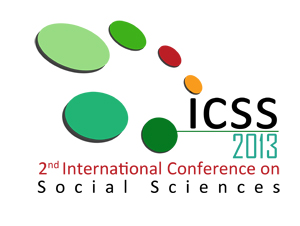 The Second International Conference on Social Sciences will be hosted by the
The Second International Conference on Social Sciences will be hosted by the 
 The 15th International Conference on Maharashtra: Culture and Society will be held at Arizona State University (Tempe and Phoenix, USA) during April 23-26, 2014. The theme of the conference will be “Interactions between Humans and the Natural World in Maharashtra.” Proposals are invited for presentations related to this theme from scholars in any field of the humanities or social sciences, as well as from natural scientists interested in the human dimensions of the natural environment in Maharashtra.
The 15th International Conference on Maharashtra: Culture and Society will be held at Arizona State University (Tempe and Phoenix, USA) during April 23-26, 2014. The theme of the conference will be “Interactions between Humans and the Natural World in Maharashtra.” Proposals are invited for presentations related to this theme from scholars in any field of the humanities or social sciences, as well as from natural scientists interested in the human dimensions of the natural environment in Maharashtra.
 As a follow-up to the 2010 conference on ”Urban Ecologies in Asia”, which was convened in Hong
As a follow-up to the 2010 conference on ”Urban Ecologies in Asia”, which was convened in Hong